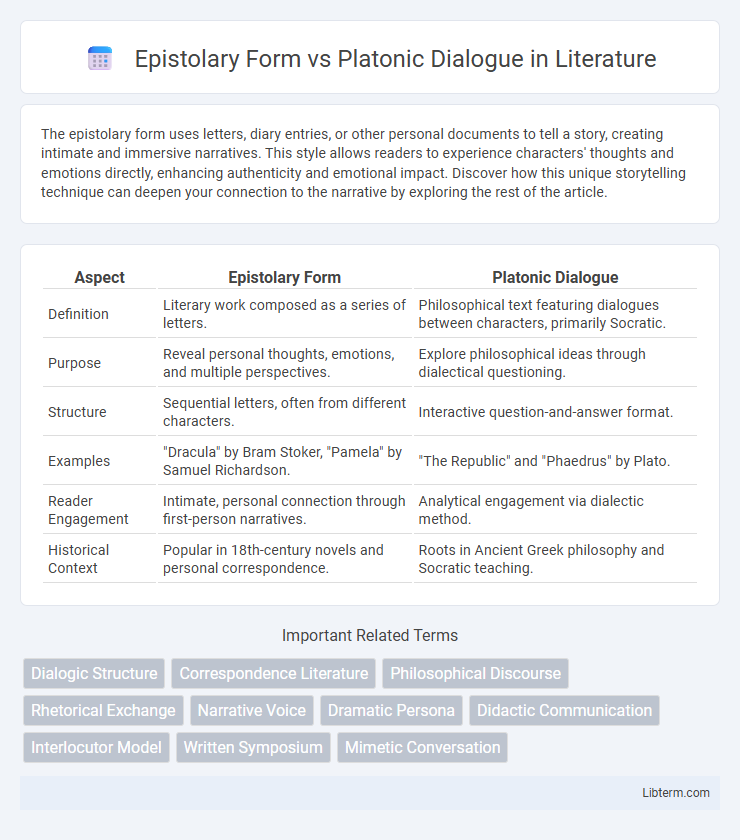The epistolary form uses letters, diary entries, or other personal documents to tell a story, creating intimate and immersive narratives. This style allows readers to experience characters' thoughts and emotions directly, enhancing authenticity and emotional impact. Discover how this unique storytelling technique can deepen your connection to the narrative by exploring the rest of the article.
Table of Comparison
| Aspect | Epistolary Form | Platonic Dialogue |
|---|---|---|
| Definition | Literary work composed as a series of letters. | Philosophical text featuring dialogues between characters, primarily Socratic. |
| Purpose | Reveal personal thoughts, emotions, and multiple perspectives. | Explore philosophical ideas through dialectical questioning. |
| Structure | Sequential letters, often from different characters. | Interactive question-and-answer format. |
| Examples | "Dracula" by Bram Stoker, "Pamela" by Samuel Richardson. | "The Republic" and "Phaedrus" by Plato. |
| Reader Engagement | Intimate, personal connection through first-person narratives. | Analytical engagement via dialectic method. |
| Historical Context | Popular in 18th-century novels and personal correspondence. | Roots in Ancient Greek philosophy and Socratic teaching. |
Introduction to Epistolary Form and Platonic Dialogue
Epistolary form utilizes letters to convey personal thoughts, emotions, and narrative progression, emphasizing a direct, intimate connection between the writer and reader. Platonic dialogue features structured philosophical conversations, typically between Socratic figures, designed to explore complex ideas through question-and-answer exchanges. Both serve as foundational literary techniques, with epistolary form fostering emotional depth and Platonic dialogue promoting rational discourse and dialectical reasoning.
Historical Origins and Literary Roots
Epistolary form traces its historical origins to ancient letter-writing traditions, prominently utilized in Roman and early Christian literature, exemplified by works like Pliny the Younger's letters and the Pauline Epistles, which shaped its literary roots in personal, direct communication. Platonic dialogue, rooted in Classical Greece, originates from Socratic methods of philosophical inquiry and debate, immortalized by Plato's dialogues such as "The Republic" and "Phaedrus," emphasizing dialectical reasoning through conversational exchange. Both forms fundamentally shaped Western literary and philosophical traditions by advancing distinct modes of narrative and ideological exploration.
Structural Differences Explained
Epistolary form consists of letters exchanged between characters, creating a fragmented and intimate narrative structure that emphasizes personal perspective and emotional depth. Platonic dialogue is a conversational format featuring philosophical discourse through a structured back-and-forth between interlocutors, designed to explore ideas logically and dialectically. The epistolary form relies on subjective narration and time gaps between letters, while Platonic dialogues employ real-time exchanges fostering analytical debate.
Purpose and Function in Literature
Epistolary form employs letters to convey intimate, personal perspectives, fostering reader empathy and revealing character psychology directly. Platonic dialogue uses structured conversations to explore philosophical ideas, promoting rational inquiry and dialectical reasoning. Both forms engage readers but serve distinct literary purposes: epistolary writings emphasize emotional depth whereas Platonic dialogues prioritize intellectual examination.
Voice and Perspective in Narrative Forms
Epistolary form employs first-person letters or diary entries, providing intimate, subjective voices that reveal personal thoughts and emotions, enhancing a direct emotional connection with the reader. Platonic dialogue uses a third-person narrative featuring distinct interlocutors engaging in philosophical debate, allowing multiple perspectives to unfold dynamically within a structured dialectical framework. These contrasting narrative forms shape voice and perspective by privileging either internalized personal expression or external collective inquiry.
Conveying Philosophy: Letters vs. Dialogues
Epistolary form conveys philosophy through personalized, subjective reflections often revealing the author's inner thoughts and emotions, fostering an intimate connection with readers. Platonic dialogues present philosophical ideas through dynamic, reasoned debates between characters, encouraging critical thinking and dialectical exploration. Letters offer a one-sided discourse emphasizing individual perspective, whereas dialogues emphasize interactive reasoning and communal search for truth.
Emotional Engagement and Reader Experience
Epistolary form fosters emotional engagement by presenting intimate, personal letters that reveal characters' inner thoughts and feelings directly, creating a sense of authenticity and immediacy for the reader. In contrast, Platonic dialogue engages readers through dynamic, philosophical conversations that challenge ideas and encourage critical thinking, often at the expense of emotional depth. Consequently, epistolary narratives tend to evoke stronger empathy and emotional connection, while Platonic dialogues prioritize intellectual stimulation and reflective reader experience.
Influence on Modern Storytelling
Epistolary form, characterized by a narrative through letters or documents, fosters intimate, subjective storytelling that deeply explores characters' inner thoughts, enriching emotional engagement in modern novels and digital storytelling formats. Platonic dialogue employs structured, philosophical conversations that influence contemporary storytelling by encouraging critical thinking, dialectical interaction, and the exploration of abstract ideas through character-driven debates in literature and screenplays. Both forms shape modern narrative techniques by enhancing character depth and thematic complexity, inspiring diverse formats from introspective first-person accounts to dynamic, idea-driven dialogues.
Notable Works and Authors in Each Tradition
Epistolary form is exemplified by works such as "Pamela" by Samuel Richardson and "The Sorrows of Young Werther" by Johann Wolfgang von Goethe, where narrative unfolds through letters revealing personal emotions and social dynamics. Platonic dialogue is best represented by Plato's own texts like "The Republic" and "Symposium," which use conversational exchanges between characters to explore philosophical ideas and ethical questions. Notable authors in the epistolary tradition include Rousseau and Sterne, while in the Platonic tradition, dialogues have been influentially utilized by philosophers like Xenophon and Cicero.
Choosing the Right Form for Literary Expression
Epistolary form uses letters to create intimate, personal perspectives while emphasizing character voice and psychological depth, ideal for exploring inner thoughts and emotional nuance. Platonic dialogue employs structured philosophical exchanges between characters to examine ideas logically and dialectically, suited for presenting abstract concepts and argumentative rigor. Writers should choose epistolary form for subjective storytelling and emotional engagement, and Platonic dialogue when clarity of ideas and dynamic intellectual debate are central to the narrative.
Epistolary Form Infographic

 libterm.com
libterm.com